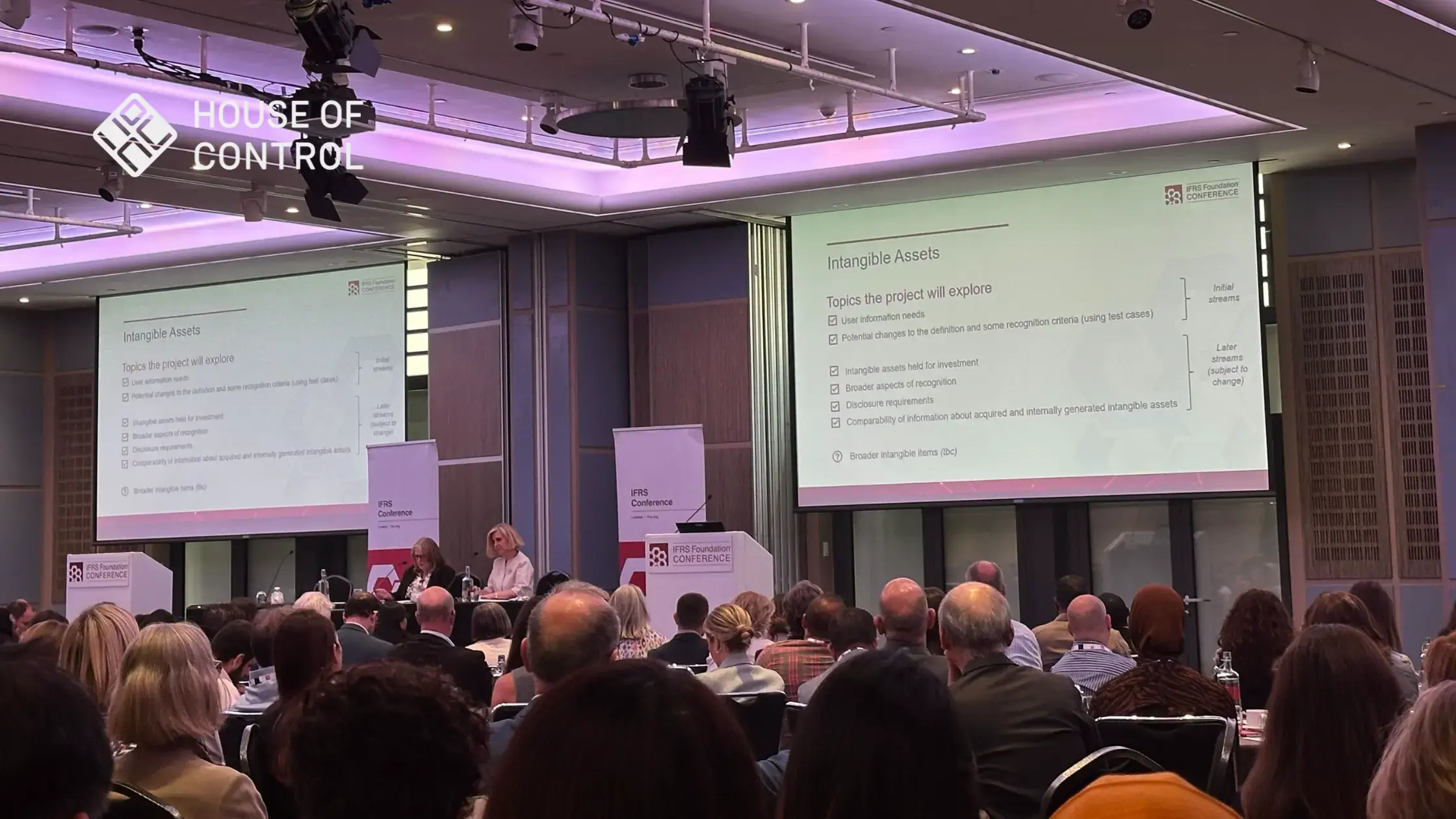GAAP to IFRS conversion checklist - Here are 13 tips for best practice
What is the best practice for converting from national GAAP to IFRS? Converting to IFRS is demanding. We have put together a list of tips to help lighten the burden on your colleagues in the finance department.
%20(2).webp?width=1002&height=564&name=1%20(21)%20(2).webp)
Are you planning an IPO? Going public can be an exciting and transformative step for any company. It not only provides access to capital but also enhances the company's visibility and credibility in the market. When considering an IPO, it becomes even more crucial to convert from national GAAP to IFRS.
Converting to IFRS before an IPO is essential because it aligns your financial reporting with international standards, making it easier for potential investors to evaluate your company's financial performance and compare it with other global players in the industry. It also demonstrates transparency and a commitment to high-quality financial reporting.
By adopting IFRS, you ensure that your financial statements are prepared using a common set of accounting rules, making it easier for investors, analysts, and regulators to understand and interpret your financial results. This can be particularly important when attracting international investors who may be more familiar with IFRS than with national GAAP.
Furthermore, converting to IFRS early in the IPO preparation process allows you to identify and address any accounting differences or complexities that may arise. This will help you avoid last-minute surprises and ensure a smoother transition to the new reporting standards.
During an IPO, potential investors will carefully analyze your financial statements to assess the company's value and growth potential. By presenting your financial information in accordance with IFRS, you provide investors with a standardized and internationally recognized framework, increasing their confidence in the accuracy and reliability of the reported figures.
Additionally, many stock exchanges and regulatory bodies around the world require companies to present their financial statements in compliance with IFRS when listing their shares. By converting to IFRS before the IPO, you ensure compliance with these regulations, eliminating any potential hurdles or delays in the listing process.
In summary, if you are planning an IPO, it is crucial to consider converting from national GAAP to IFRS. This conversion will not only enhance the transparency and comparability of your financial statements but also facilitate the IPO process and attract a wider pool of potential investors. So, take the necessary steps early on to ensure a successful transition to IFRS and maximize the value of your IPO.
Here are our top 13 recommendations
1. Start early
Starting the IFRS conversion process early is crucial for a smooth transition. It allows for thorough analysis, resource allocation, and planning. Involving key stakeholders and providing comprehensive training ensures alignment and success. Early testing helps identify errors and inconsistencies, reducing the risk of issues with investors and regulators. Starting early is essential to ensure accuracy, precision, and compliance with international standards.
2. Gain support
Communicate the purpose and benefits of IFRS reporting to engage and motivate employees. Organize a kick-off meeting to explain the reasons behind the conversion and highlight the advantages of adopting IFRS. Provide comprehensive training, encourage open communication, recognize team efforts, involve employees in decision-making, and regularly communicate updates to foster a motivated and dedicated team.
3. Assess how the IFRS conversion affects key figures
Analyze the impact on financial statements and identify any discrepancies. Take appropriate measures to ensure compliance with lending terms and make informed decisions to mitigate negative consequences. Implement changes to internal processes or systems for accurate reporting under IFRS. This step is crucial for a smooth transition and positive relationships with lenders and stakeholders.
4. Prioritize and tackle the most demanding tasks early on in the conversion process
Conduct a comprehensive analysis of financial statements to identify discrepancies between current accounting standards and IFRS. Create a detailed plan to address these tasks, implement changes to internal processes or systems, and document steps taken to ensure accuracy and simplify the auditor's review. This will facilitate a smoother transition, compliance with international standards, and enhance transparency in financial statements.
5. Identifying the differences between national GAAP and IFRS
One crucial step in converting to IFRS is identifying the differences between national GAAP and IFRS. Analyze varying financial statement captions and prioritize tasks accordingly. Create a detailed plan, anticipate challenges, and ensure compliance with international standards.
Industry-specific regulations should also be considered for a comprehensive analysis. By addressing these differences early on, you can enhance transparency and successfully transition to IFRS.
6. Document the GAAP differences
Document the GAAP differences throughout the conversion process to ensure accuracy, transparency, and compliance with IFRS. This includes providing clear descriptions and calculations, maintaining ongoing documentation, and addressing any issues or discrepancies systematically. Overall, documenting the GAAP differences is essential for simplifying the auditor's review, promoting transparency, and ensuring consistency in financial reporting.
7. Create clear (and if possible) automated routines
Implementing clear and automated routines for accounting reports is crucial during the conversion process from national GAAP to IFRS. This streamlines the reporting process, ensures accuracy and consistency in financial statements, and saves time and money in future reporting. Standardized procedures and automation tools enable the generation of accurate and reliable financial statements, improving efficiency, accuracy, and consistency in financial reporting and ensuring compliance with international standards.
8. Evaluate the effect of future regulation
Anticipate future regulations and consult your auditor for insights. While the immediate focus is on converting to IFRS, it's important to consider upcoming rules and guidelines that may affect your financial reporting. By proactively evaluating the impact of future regulations, you can make necessary adjustments and ensure continued compliance with international standards. This demonstrates your commitment to transparency and enhances investor confidence in your company.
9. Check industry-specific areas within IFRS
Consider industry-specific requirements - While converting to IFRS, it's important to understand that each industry has its own unique considerations. Analyze industry-specific regulations and identify differences between national GAAP and IFRS that may impact your financial statements.
Seek guidance from industry experts, professional organizations, and peers who have undergone the conversion process. Document all assessments in separate memos to ensure compliance and enhance the relevance of your financial information.
10. Set aside time to document assessments made in separate memos
Set aside time to document assessments in separate memos, ensuring accuracy and consistency in financial reporting. These memos serve as a reference for easy retrieval of information, support communication with stakeholders, and provide a valuable resource for future reference. Prioritizing this task enhances transparency and reliability, contributing to a successful transition to IFRS and maximizing the value of your IPO.
11. Acquisitions - Have you made acquisitions in recent years?
Assess acquisitions - Evaluate recent acquisitions for potential differences between national GAAP and IFRS regarding acquisition costs and goodwill amortization. Conduct a thorough Purchase Price Allocation (PPA) analysis to accurately reflect the acquired company's value and comply with IFRS. Seek guidance from accounting professionals to ensure accurate financial reporting. This enhances transparency, investor confidence, and the appeal of your company during the IPO process.
12. Choose a solid sparring partner
When choosing a sparring partner for your IFRS conversion, opt for an experienced auditor network. These networks have in-depth knowledge of IFRS standards and can offer valuable guidance throughout the process. Working with a reputable auditor network ensures accurate financial statements and compliance with international standards. Despite charging on an hourly basis, the investment is worthwhile when following the recommendations outlined in this blog post, maximizing the value received for your money. Ultimately, a solid sparring partner enhances the transition to IFRS, improves financial reporting, and maximizes the value of your IPO.
13. Get an early overview of leases and contracts which are covered by IFRS 16
Prioritize gaining an early overview of leases and contracts covered by IFRS 16. Implement a contract management system designed for IFRS 16 compliance to centralize lease data, track terms and payments, and generate accurate lease accounting information. This proactive approach ensures a smooth transition, accurate financial reporting, and maximizes the value of your IPO.



.webp)